|
|
|
Sort Order |
|
|
|
Items / Page
|
|
|
|
|
|
|
| Srl | Item |
| 1 |
ID:
162742
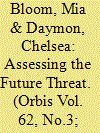

|
|
|
|
|
| Summary/Abstract |
The Islamic State of Iraq and Syria's (ISIS) Virtual Caliphate shows no signs of diminishment. With the group's loss of territory and with social media platforms increasingly policed, Telegram, a messaging application, remains ISIS's key platform for disseminating propaganda and recruiting new members. Telegram's security features, cross-platform construction, and secret chat option offer a secure environment for interaction between ISIS and its supporters. On Telegram, ISIS manipulates an environment rich with addictive properties, creating online spaces that encourage group identity, shared opinions, and dominant ideologies, while exploiting an individual's need to be a part of the group. This research investigates how Telegram is used by ISIS and its supporters and assesses what kind of threat the use of Telegram poses for the future.
|
|
|
|
|
|
|
|
|
|
|
|
|
|
|
|
| 2 |
ID:
154973
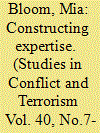

|
|
|
|
|
| Summary/Abstract |
The academic literature is divided with regard to whether terrorist recruits are dangerous masterminds, “malevolently creative,” and capable of perpetrating well-planned mass casualty attacks in the heart of European capitals. Or whether they are imbeciles, incapable of carrying out the most basic tasks, who mostly end up blowing themselves up by accident. This duality about the capabilities of terrorists is reflected in analyses of terrorist incidents. In fact, both depictions of terrorist recruits are accurate. Acuity and professionalism are not movement dependent (the same group may attract a variety of recruits) and might, instead, reflect a recruitment cycle that terrorist groups experience—one that alternates between labor-intensive and expertise-intensive periods of recruitment. The phases may shift because of external pressures (periods of territorial expansion/contraction) and opportunities (need for better quality recruits) with associated shifts in how groups use propaganda to attract a different quality of recruit during different periods of time. A possible first step toward hindering terrorist recruitment is to better understand the ways in which terrorist organizations work—where and when they recruit, whom they target, and the different propaganda messages used for selective/targeted recruitment. A clearer picture of the process could provide opportunities to counter a group's appeal, replenish their ranks, and inoculate vulnerable populations against recruitment. Case studies of three different terrorist organizations (Al Qaeda, the Islami State in Iraq and Syria [ISIS], and the Provisional Irish Republican Army [PIRA]) presented here posit that there exists a terrorism “recruitment cycle” that alternates between labor and expertise focus, uses different recruitment strategies and different propaganda messaging depending on this cycle.
|
|
|
|
|
|
|
|
|
|
|
|
|
|
|
|
| 3 |
ID:
098185
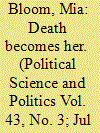

|
|
|
| 4 |
ID:
154975
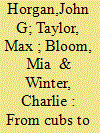

|
|
|
|
|
| Summary/Abstract |
Using the Islamic State in Iraq and al-Sham (ISIS) as a case study, we explore the process by which children evolve from novice recruits to fully fledged members of a violent extremist movement. From currently available data, we propose six stages of child socialization to ISIS—Seduction, Schooling, Selection, Subjugation, Specialization, and Stationing. Furthermore, we explore this process in the context of “Community of Practice” (COP) as developed by Wenger and Lave. COP models highlight how newcomers learn and pass through degrees of involvement from the periphery of an organization to the inside. In subsequent research, Hundeide highlighted how “contracts of deep commitment” and “conversion” constitute important social and psychological elements of communities of practice. We regard such qualities as intrinsic to children's involvement in ISIS. We conclude with implications drawn from the disengagement and reintegration experiences of former child soldiers in other contexts.
|
|
|
|
|
|
|
|
|
|
|
|
|
|
|
|
| 5 |
ID:
191456
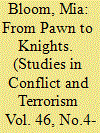

|
|
|
|
|
| Summary/Abstract |
As terrorist groups became more technologically advanced with their media campaigns, the global audience began to see pictures of women in black burkas pledging allegiance to the so-called Islamic State of Iraq and Syria (ISIS) and posing with guns. Although there is a backlash against such change that we see reflected in the ideologies of violent extremism; the shifts in gender relations within these groups are significant to examine. Further, we face questions about the repatriation of ISIS women and children to their countries of origin – notably questions of agency and culpability within the mainstream media. This paper asks: to what extent have women’s roles changed within and across terrorist groups? Is there a move toward women’s empowerment, or is it a facade? Analyzing the three cases of Al-Qaeda (AQ), Islamic State of Iraq and Syria (ISIS), and Kurdistan Workers’ Party (PKK) does their advent represent a significant shift? The emergence of ISIS and Boko Haram’s explicitly gendered strategies of violence and recruitment within the highly patriarchal and misogynistic Salafi-jihadist culture, and PKK’s postconflict gender-equal political advances demonstrates that addressing women’s agency through a gendered analysis outside of the masculine domain is imperative. Scholars should challenge the idea that women have limited roles.
|
|
|
|
|
|
|
|
|
|
|
|
|
|
|
|
| 6 |
ID:
101889
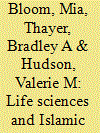

|
|
|
| 7 |
ID:
066369
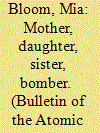

|
|
|
| 8 |
ID:
169931
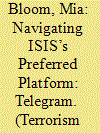

|
|
|
|
|
| Summary/Abstract |
Islamic State in Iraq and Syria (ISIS) online recruitment has been the subject of considerable interest by journalists and technology writers, but there has been no scholarly work to date exploring ISIS Telegram channels and chat rooms. Telegram has played an important role in recruitment and coordination in recent ISIS/terror attacks in Europe. Further, Telegram is quickly replacing the group’s online presence on more open platforms such as Facebook and Twitter as these companies aggressively police and shut down ISIS-linked accounts. This research note aims to demystify Telegram, explain how it can be used for research, and discuss some of the addictive qualities associated with user engagement.
|
|
|
|
|
|
|
|
|
|
|
|
|
|
|
|
| 9 |
ID:
062080
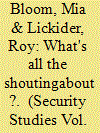

|
|
|
|
|
|
|
|